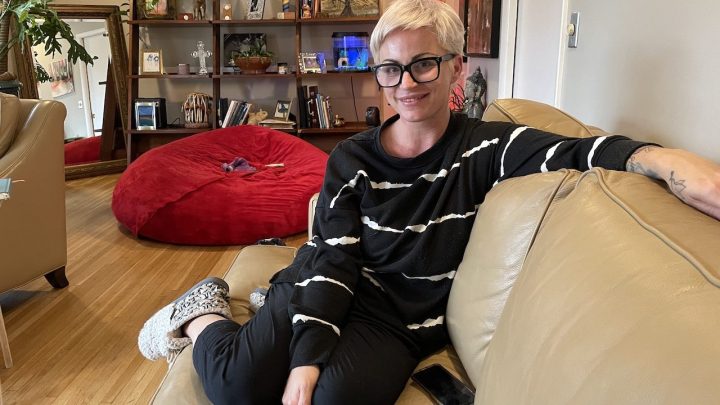
Private equity investment is flooding into addiction treatment. Is that a good thing?
Private equity investment is flooding into addiction treatment. Is that a good thing?

Even amid the pandemic in 2020, the Nashville Recovery Center tried to get people together as safely as it could for events like a Sing & Share night led by a singer/songwriter on staff.
“So, we don’t talk about it, pretend that it’s not there,” Mitzi Dawn sang as she strummed her guitar on stage.
People in recovery showed up by the hundreds. It was precisely the kind of offering founder Ryan Cain, who himself was in recovery, envisioned when he started the place in 2018 — a safe place to drop in, play pool, watch a game or meet with a 12-step sponsor.
“We make it open to pretty much anyone, any time of day. About 80% of what we do doesn’t cost anything,” he said in an interview on YouTube.
Then, he sold the business and its sober living and detox facilities for an undisclosed sum to BRC Recovery, a company out of Texas that had recently won backing from two private-equity firms, Veronis Suhler Stevenson and NewSpring Health Capital.
Private equity has found its way into much of the American economy in recent decades, with rapid moves into health care. Addiction treatment — now seen as a big moneymaker — has become a prime investment target because of the ongoing opioid overdose crisis and improved health insurance coverage.
As with many corporate takeovers, the ride can be bumpy. But in this case, those affected are especially vulnerable.
In Nashville, an all-hands meeting was announced in the summer of 2021.
“They brought us doughnuts and said, ‘We have an exciting announcement,’” Dawn recalled. “’We’re selling it, but don’t freak out, because nothing is going to change. It’s just they have more money so you’re going to be able to be paid more.’”
But it became clear to Dawn, she said, that the new owner wasn’t interested in spending more but less. Pay schedules changed. She said she waited six months for her final check after the Sing & Share budget was scaled back.
Dawn moved on to work for another independent treatment facility, but she worried about her colleagues. Many of them — like herself — are also in recovery, she said.
“You have a perfect breeding ground to be able to take advantage of a lot of really good-hearted, well-intentioned people,” Dawn said.
Many addiction treatment centers end up hiring former clients. Most need the work and have relevant experience. But usually, there’s a policy of requiring that they be sober for at least two years. For Nanci Milam at Nashville Recovery, it was just six months.
In 2021, Milam had been through the same sober living program where she’d become a house manager. Two days a week, she worked for free as payment to live there, which was required. She also had to handle residents’ medication, which could be abused. Milam said she was fortunate to keep her sobriety in those early months working.
“I would say it was not with my recovery in the best interest,” she said, a year after leaving. “I think it served their need, and I was ambitious. But it should not have happened.”
Milam said she left because the company still hadn’t helped her start her certification as a drug counselor as it had promised.
BRC did not answer specific questions for this story, reported in partnership with Kaiser Health News, but said in a statement that many of the complaints patients and former employees shared are no longer accurate.
BRC’s expansion was just one of 127 mergers and acquisitions in the behavioral health sector that year — a record, according to Capstone Partners. And roughly half of those deals were fueled by private equity, which often takes on debt, reorganizes a business and then sells.
“Private equity — regardless of what industry they’re investing in — want[s] to double or triple their investment in a pretty short period of time,” said Eileen O’Grady, research director for the nonprofit watchdog Private Equity Stakeholder Project.
By one research group’s estimate, there are roughly 14,000 treatment centers that dot the country. And private equity has seen vast opportunity with many operating as standalone centers.
The fragmented industry could use some standardization and investors might help, O’Grady said. But she’s concerned by the lack of regulation and transparency.
“More than other areas of health care, addiction medicine or mental health treatment are very, very opaque in the same way that private equity as an industry is very opaque. Couple those together, you have basically a black box,” she said.
With so many families desperate to find help for loved ones in addiction, sometimes the best option is the only one. And that demand, O’Grady said, is great for investors — but not for patients.
Update: Jan. 25, 2023: This piece has been updated to include a response by BRC.
There’s a lot happening in the world. Through it all, Marketplace is here for you.
You rely on Marketplace to break down the world’s events and tell you how it affects you in a fact-based, approachable way. We rely on your financial support to keep making that possible.
Your donation today powers the independent journalism that you rely on. For just $5/month, you can help sustain Marketplace so we can keep reporting on the things that matter to you.

















